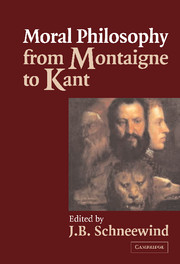Book contents
- Frontmatter
- Contents
- Preface
- Acknowledgments
- Foreword to the One-Volume Reprint
- Introduction
- PROLEGOMENA: SOME QUESTIONS RAISED
- PART I REWORKING NATURAL LAW
- PART II INTELLECT AND MORALITY
- PART III EPICUREANS AND EGOISTS
- PART IV AUTONOMY AND RESPONSIBILITY
- The Earl of Shaftesbury
- Francis Hutcheson
- Joseph Butler
- David Hume
- Christian August Crusius
- Richard Price
- Jean-Jacques Rousseau
- Thomas Reid
- Immanuel Kant
- Supplemental Bibliography
Richard Price
Published online by Cambridge University Press: 05 June 2012
- Frontmatter
- Contents
- Preface
- Acknowledgments
- Foreword to the One-Volume Reprint
- Introduction
- PROLEGOMENA: SOME QUESTIONS RAISED
- PART I REWORKING NATURAL LAW
- PART II INTELLECT AND MORALITY
- PART III EPICUREANS AND EGOISTS
- PART IV AUTONOMY AND RESPONSIBILITY
- The Earl of Shaftesbury
- Francis Hutcheson
- Joseph Butler
- David Hume
- Christian August Crusius
- Richard Price
- Jean-Jacques Rousseau
- Thomas Reid
- Immanuel Kant
- Supplemental Bibliography
Summary
Introduction
Richard Price was a Welsh Dissenting minister who, after writing a major work in moral philosophy, made important contributions to understanding of the statistics involved in life insurance, was active in the political and economic debates of his time, and returned to philosophy to carry on a debate with Joseph Priestley about free will. He was born in 1723, and he died in 1791. One of his last works was a defense of the French Revolution, which prompted Edmund Burke's impassioned attack on it, the Reflections on the Revolution in France. Price had earlier written in favor of the American colonies in the dispute between them and Great Britain. His political defense of the rights of individuals to determine the course of their own lives is of a piece with his philosophical defense of free will and individual agency and with his religious sense of the importance of each person's responsibility for his or her own actions.
Price's Review of the Principal Questions in Morals, first published in 1758 and revised for later editions in 1769 and 1787, is one of the most remarkable of British eighteenth-century treatises on ethics, bringing to some of the major controversies of the time a new degree of sophistication and insight. It opens with a long attack on Locke's claim that all ideas must come from sensation or reflection, contending that the mind can be the source of ideas not derived from experience.
- Type
- Chapter
- Information
- Moral Philosophy from Montaigne to Kant , pp. 586 - 604Publisher: Cambridge University PressPrint publication year: 2002

